By Lucy Komisar
Part Commedia dell‘arte, part pageant, part ballet, with a touch of music hall comedy, “Masquerade” is a visual feast. Presented by the Vakhtangov State Academic Theatre of Russia in Moscow, it is directed by Rimas Tuminas of Lithuania. Though the major actors are all prominent in Russia, Tuminas is the unseen star of the show.
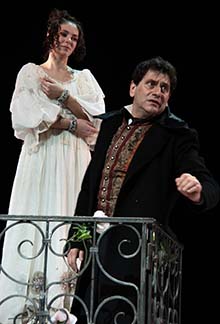
The story is an 1835 classic by the great Russian poet Mikhail Lermontov. My companion at the theater said she had studied it at school in St. Petersburg. She was a bit surprised at this staging, as it was written as a naturalistic play. But so were Shakespeare’s!
Aram Khachaturian’s music dominates with the emotional violins and cymbals written for the 1941 staging.
This in fact is a stylized 19th-century take on “Othello,” with a jealous aristocrat Arbenin (a tough, acerbic Evgeny Knyazev) accusing his na¯ve young wife Nina (an ethereal Maria Volkova) of having an affair. In this case, the handkerchief turns out to be a bracelet which the Baroness (the mischievous Lidia Velezhova), a cynical widow with a hostility to men, found and gave to the womanizing Prince (Leonid Bichevin, who persuades one he is indeed self-involved royalty).
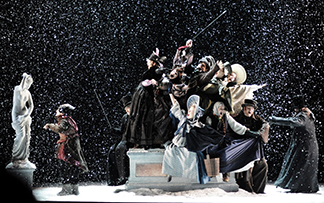
The fantastical scene (by Adomas Yatsovskis) includes a giant fish that opens and closes its mouth and a snow ball that starts small and grows gigantic as it is pushed by the clownish put-upon servant (an excellent Oleg Lopuhov).
And the snow! On the ground, drifting down from the sky, people pushed together move across it on the stage as if they were in a sleigh.
Men in top hats and cape coats are gamblers, party-goers, local aristocrats. Women in gorgeous 19th-century dresses are of the Beau Monde. (Costumes by Maxim Obrezkov.) The world may be elegant, but the beauty is marred by intrigue and duplicity. The masks cover up the fakery of the aristocrats, whose lives are shown to be a masquerade.
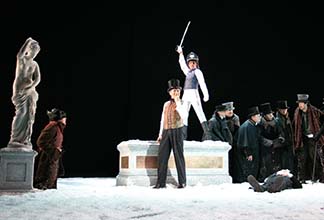
There‘s sexism and push-back feminism. The prince tries to assault Nina‘s sister. She finds a defender who growls at him and throws him to the ground.
Nina, dressed in purity white, is ready to give up the life of the Beau Monde and stay at home with her husband.
But she has a dilemma: she lost her bracelet. The Baroness found it and gave it to the Prince. Arbenin is deceived about how he got it, thinks the worst and wants revenge on his wife.
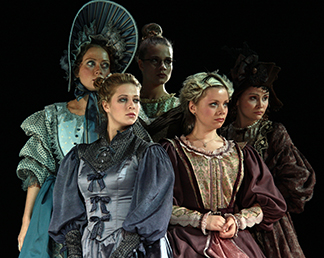
But this anger and mistrust works both ways. The Baroness leads the other women in a denunciation of men. “What do we live for? Always to please a stranger we abhor and to be enslaved…A plaything for his passions…What is the woman for? Auctioned from youth….Farewell happiness.” Strong stuff in 1835.
One of Arbenin‘s old friends says his actions towards his wife are “to possess her, not to make her happy.” But Arbenin will have none of that. He is in sorrow for lost bachelorhood and vows to abandon virtue. As if he had it!
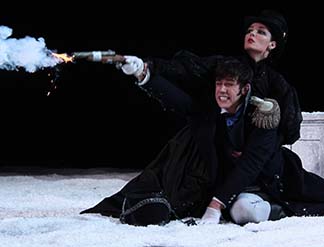
It gets complicated with a pledge of murder, a secret letter, a threatened duel. Dancers to Khachaturian‘s “Masquerade Waltz” move through the snow, and the ominous snowball gets bigger.
Suddenly, a modern hockey play skates across the stage perplexed about the surroundings. And in the midst of all the life crises, the Russian aristocrats eat ice cream!
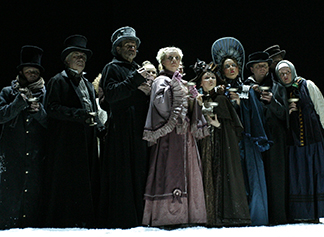
More dreamlike, the bent-over servant pulls a long rope that reminds one of Lucky in “Godot,” but he is dragging not a cart, but a piano. It turns out to be filled with snow. Men shoot at it and destroy it. A metaphor? At any rate, it takes Lermontov into a more surreal century.
If you don‘t understand Russian, you can check the super-titles, though there‘s enough mime and broad theatrical staging to make events clear.
The theater, one of the oldest Moscow companies, was founded by Eugene Vakhtangov, a student of Stanislavsky. It appears to have dropped some of his realism and picked up an avant garde sensibility along the way!
“Masquerade. Written by Mikhail Lermontov, directed by Rimas Tuminas. Vakhtangov State Academic Theatre at Cherry Orchard Festival, New York City Center, 131 West 55th Street, New York City. 800-349-0021. June 13-16, 2019. 6/14/19. Also on NY Theatre Wire.

